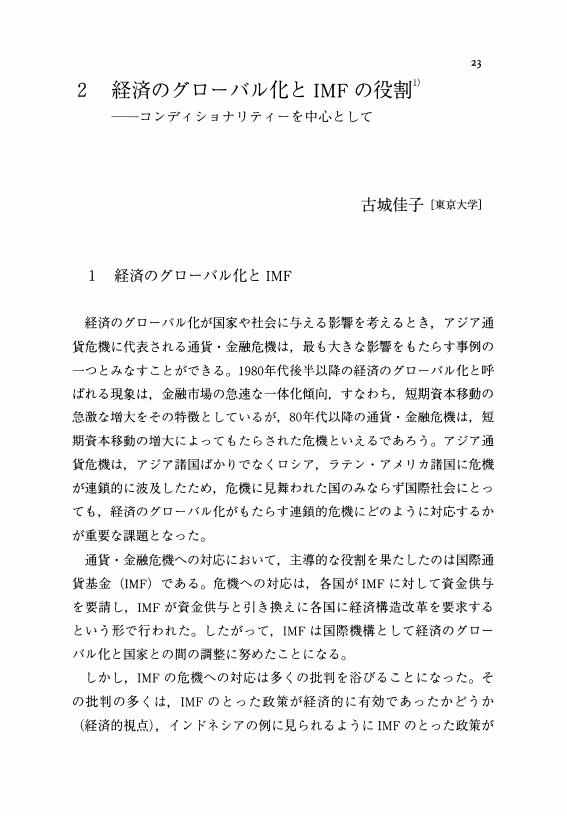1 0 0 0 OA 2 経済のグローバル化とIMFの役割 ―コンディショナリティーを中心として
- 著者
- 古城 佳子
- 出版者
- 日本比較政治学会
- 雑誌
- 日本比較政治学会年報 (ISSN:21852626)
- 巻号頁・発行日
- vol.2, pp.23-40, 2000-06-20 (Released:2010-09-09)
- 参考文献数
- 21
1 0 0 0 OA グローバリゼーションの何が問題か 国際政治における理論的課題
- 著者
- 古城 佳子
- 出版者
- 世界法学会
- 雑誌
- 世界法年報 (ISSN:09170421)
- 巻号頁・発行日
- vol.2005, no.24, pp.3-23, 2005-03-31 (Released:2011-02-07)
- 参考文献数
- 44
- 著者
- 古城 佳子
- 出版者
- 一般財団法人 日本国際政治学会
- 雑誌
- 国際政治 (ISSN:04542215)
- 巻号頁・発行日
- vol.1998, no.119, pp.217-220, 1998
1 0 0 0 座談会 国際秩序は揺らいでいるのか (揺らぐ国際秩序)
- 著者
- 遠藤 乾 大芝 亮 中山 俊宏 宮城 大蔵 古城 佳子
- 出版者
- 日本国際問題研究所
- 雑誌
- 国際問題 = International affairs (ISSN:04523377)
- 巻号頁・発行日
- no.668, pp.1-17, 2018-01
1 0 0 0 OA 市民のニーズを反映する制度構築と政策形成の政治経済学
- 著者
- 田中 愛治 川出 良枝 古城 佳子 西澤 由隆 齋藤 純一 吉川 徹 小西 秀樹 船木 由喜彦 今井 亮佑 品田 裕 飯田 健 井柳 美紀 遠藤 晶久 清水 和巳 Jou Willy 千葉 涼 日野 愛郎 三村 憲弘 村上 剛 山崎 新 横山 智哉 加藤 言人 小川 寛貴 坂井 亮太 中西 俊夫 劉 凌
- 出版者
- 早稲田大学
- 雑誌
- 基盤研究(S)
- 巻号頁・発行日
- 2013-05-31
熟慮を経てから市民のニーズを測定するCASI調査と、熟議を通して市民のニーズを探るミニ・パブリックスを比較分析すると、熟議に基づくミニ・パブリックスよりも、熟慮に基づくCASI調査の方がサンプルの代表性は高く、実施のコストが低い点では好ましい。しかし、本プロジェクトの実験・調査を通して、熟慮だけでは難しいが、熟議を通してこそ達成できる効果もあることが分かった。例えば、事実に対する思い込みの是正においては、熟慮ではなく、熟議の効果が確認できた。したがって、CASI調査(熟慮)とミニ・パブリックス(熟議)のどちらにも利点があることが明らかになり、一概に両者の優劣をつけることはできないといえる。
- 著者
- 古城 佳子
- 出版者
- JAPAN ASSOCIATION OF INTERNATIONAL RELATIONS
- 雑誌
- 国際政治 (ISSN:04542215)
- 巻号頁・発行日
- no.115, pp.94-109,L13, 1997
The purpose of this article is to examine what kind of logic was behind the demand of defense burden-sharing toward Japan by the United States in the late 1950s and 1960s. This article presents the following viewpoints. First, US demand of defense burden-sharing was colsely related to the problem of US balance of payments deficit from the late 1950s. Second, in order to better understand the problem of US-Japan defense burden-sharing in the late 1950s and 1960s, it should be analyzed in the context of US policy towards the allied nations, rather than just in the context of bilateral relations.<br>In the late 1950s, in the face of gold outflow the Eisenhower administration began to realize that the balance of payment deficit would impose serious problem on the United States. This administration created the scheme of burden-sharing among the allied nations. This scheme was reinforced by Kennedy administration, which claimed that the US balance of payments deficit would restrain US policy of protecting "the Free World, " thus harm not only the United States but also the allied nations.<br>In this context, the US administrations tried to defend dollar position by focusing on two points expanding US export to increase trade surplus, and reducing external spending, in particular, foreign aid and military expenditure. The US administrations asked the allied nations to share the cost of US foreign aid and military spending. This is the origin of the burdensharing scheme. In other words, since the late 1950s the allied nations were asked to increase foreign aid and military spending. For evaluating which country should share the burden, the US applied two economic measurements; balance of payments surplus and sufficent foreign exchange reserves.<br>West Germany was the main target of the US demand of defense burdensharing because of the large US military presence in West Germany and its rapid recovery of economy in terms of balance of payment surplus and large foreign exchange reserves. The United States started to ask West Germany to share the defense cost as early as in the late 1950s. The negotiation of offset payment agreement between Germany and the US shows the US tough policy towards West Germany.<br>In contrast, the US did not put much pressure on Japan to share the defense cost until the mid-1960s. This US lenient attitude toward Japan compared to policy towands West Germany was partly because of Japan's domestic political instability relating to the revision of the US-Japan Security Treaty in 1960 and partly because of Japan's economic indices which were short of US criteria; balance of payment deficit and small foreign exchange reserves.<br>However, in the mid-1960s, the US demand of defense burden-sharing toward Japan increased because Japan's economic situation had improved. The demand was intensified by the US increased involvement in the Vietnam War. Japan, as well as West Germany, was asked to buy US arms and US Treasury bill to contribute to improve US balance of payment. Since this period, the US claim that the United States provided "public goods" for "the Free World" became problematic for the allied nations.
1 0 0 0 山本吉宣先生に聞く--山本吉宣先生業績
- 著者
- 山本 吉宣 山影 進 古城 佳子
- 出版者
- 東京大学大学院総合文化研究科国際社会科学専攻
- 雑誌
- 国際社会科学 (ISSN:13482793)
- 巻号頁・発行日
- vol.53, pp.1-15, 2003

